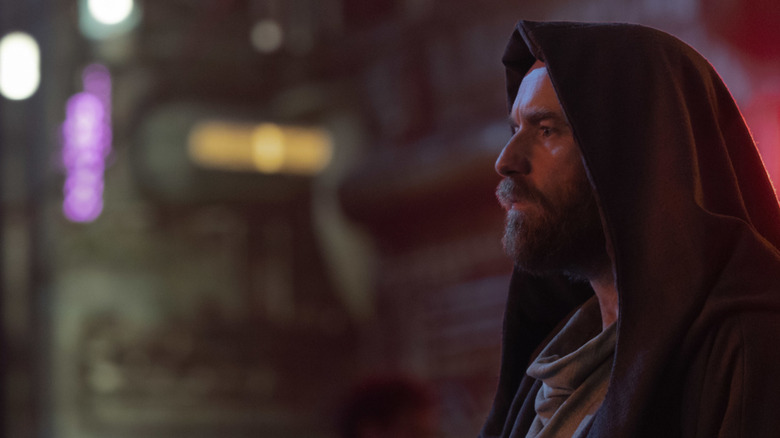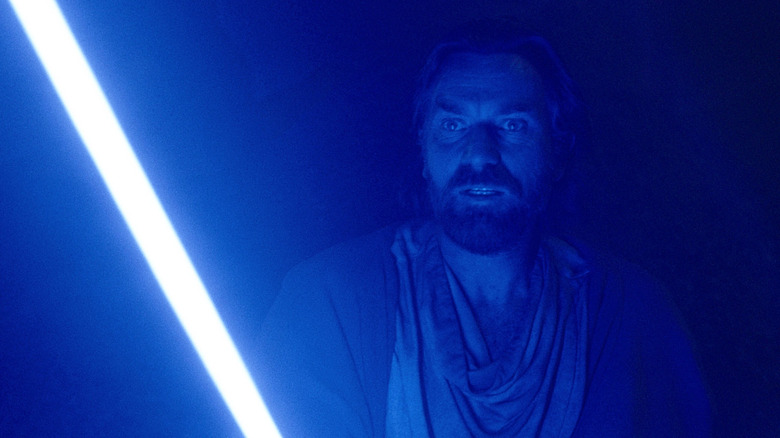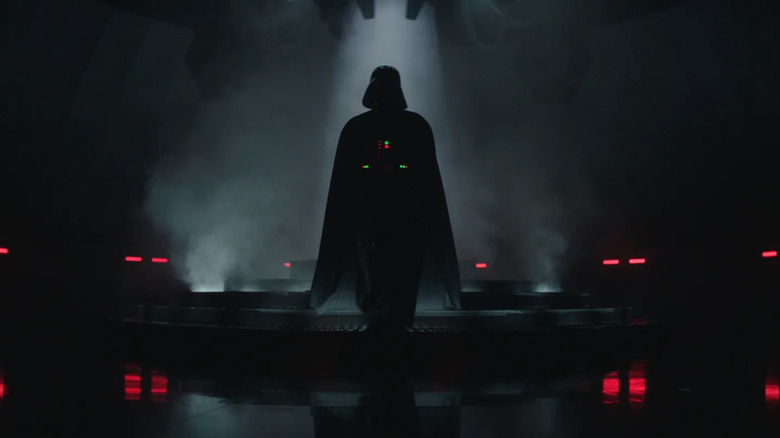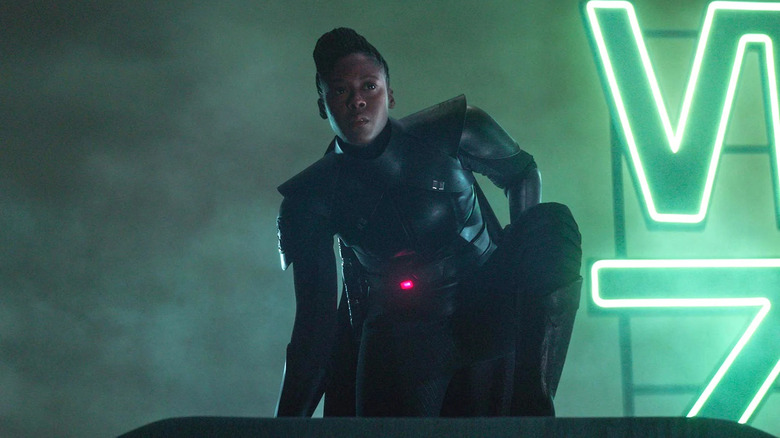Obi-Wan Kenobi Composer Natalie Holt Breaks Down Scoring The Show's Biggest Scenes [Interview]
Natalie Holt has now created a new sound for two major franchise characters. The composer previously scored Marvel's "Loki" series and most recently lent her talents to "Obi-Wan Kenobi." No pressure, of course — there's only 40 years of history, fan expectations, and Lucasfilm involved. But with director Deborah Chow, Holt helped tell the story of characters leaving the dark and seeing the light.
It was a very different experience for Holt compared to her time on "Loki," which she composed during lockdown and never met anyone involved in person. All recordings were done remotely, which made her miss recording with musicians. With "Obi-Wan Kenobi," though, Holt had a huge orchestra and a variety of tools to help tell the new chapter in Obi-Wan's story. Recently, Holt told us about her experience scoring the Disney+ series and its standout moments.
Warning: Huge spoilers ahead.
'This isn't Star Wars enough'
With episode 1, how did you want to help set the tone for the series? What themes did you want to set up?
Well, it changed, because when I started, we didn't know if John [Williams] was going to be involved or not. When I first started writing for the series, I had a month where Deborah was saying, "We're not going to be allowed to use any of the old themes, so let's just do something new." She'd been thinking about a spare score, paring back to a piano or something for Obi. She said, "Not even an instrument, just like a whistle, just something simplistic. He's alone in the desert and lost and alone and maybe we could reflect that with the score."
It just didn't work. It needed more. I've been on this journey trying to find a theme. It was hard because you've got the tone, like "The Mandalorian" and all the classic "Star Wars" music that you are used to. And this doesn't fit. It's in between, because you've got heritage characters and new characters. Really, early on in the first meeting I played Deborah the Inquisitors theme and she said, "Yep. Perfect." It stayed. That theme was the one that came first. I did something modern and rhythmic for them and with lots of synths, and it seemed to work. With Leia and Alderaan and all those, it was more tricky to find them because of striking the right balance between the old and the new.
Once John came on board and we knew that we were going to get that main theme from him, then it changed everything. He watched it through and allowed us to use the themes in episode 6 as well. We knew where we were going, and that set the tone once he came aboard.
The idea of the lonely piano for the lonely figure in the desert sounds great, though. Did it not work because it wasn't overtly "Star Wars?"
Yeah. That's always a thought. It's like, "This isn't 'Star Wars' enough." It's such a specific thing. There are all these people who've been on board, John himself and Bill Ross, who've been with this for 40 years. Things are always going past people who can decide, like Kathleen Kennedy. She vets all the music as well. It's a specific tone that you have to find. It was interesting.
Once you got John Williams' theme for Obi-Wan, how did that open doors for you? How did that inspire the music you were composing?
Yeah, just seeing how he was orchestrating it, using more orchestral colors, kind of somewhere in the middle, going back to that big sweeping "Star Wars" sound that everybody wants, that big orchestra sound. But I think Deborah wanted to keep things a bit more minimal. I think she wanted me to bring a bit more of a modernity to it. She wanted my synths and the more unusual instruments that I brought to the game as well, but there's the subtle balance with the big orchestral sound as well.
The whole process sounds like one gigantic balancing act.
Yeah, yeah. The whole time was a real balancing act. I don't think everybody's going to ever be happy, unless John had done the whole thing. I'm sure there are some "Star Wars” fans that wish that was the case, but he's 90. I think it's really appropriate how this leads to those. The payoff in episode 6 is so big. You realize, "Oh, he's become Vader now." I had the rhythm from the Imperial March all the way through, leading to that point. When he finally gets there, it feels satisfying and thrilling to hear that theme finally.
How about the use of the Force theme? How much should it be used? It's great in episode 2.
The Force Theme is a real contentious one, and I think George Lucas himself just felt the Force Theme got a little overused in the J.J. Abrams world. I think in the end, when Obi lifts the rock, that's still ... he's found the Force there, but he's still not with the Force when he's saving Leia in episode 2. It's sort of the stirrings of it again. Yeah, that moment was Bill Ross from John Williams' camp, that was the one moment in episode 2 that he oversaw. There was a handover, into making sure that was more in the traditional vein, that little section where he saves Leia as she falls down. Before that there's quite a modern chase sequence across the roof and Reva's parkouring over the roof. And so it goes into that, into something a little more traditional "Star Wars."
Can you really tinker with the past work much? If you wanted to make any tiny adjustments to the Force Theme, can you?
Well, that's the thing. I think all those moments where there were snippets of John Williams, it was a group. It's not me deciding "This is what I'm going to do." Because you're in a franchise like this, it's bigger than you. There are so many voices. John Williams and his team have got so much experience of what the "Star Wars" music is, that those moments felt they were very steered by the people in charge, if that makes sense.
'I dragged in elements which were more sound design for Vader's rage and his unleashed fury'
In episode 3, when Vader and Obi-Wan are back in each others' presence, the combination of strings and silence is really suspenseful. How'd you find the right pace for it, when to go big and when to go silent?
That took a few goes, that section, making sure it was dark enough, actually. There was a version before which actually got recorded and then everyone was like, "No, it's not dark enough." It was much more 1970s "Star Wars" and a bit lighter and more traditional. Everyone felt it was too light. We went back to it. Actually, that scene had quite a lot of low end synth drones and pulses going on underneath to make it darker as well, like rumblings underneath.
Any moments you wanted to be more like early-2000s "Star Wars?"
There's that flashback moment where he's having that training session with Hayden, and that feels like 2000s "Star Wars," doesn't it? I think everyone loved that. It's amazing that they managed to do the work. That was shot recently when Hayden's in his 40s, but they managed to make it look authentic to the 2000s. It's incredible, pulling all these strands together that all the fans hopefully felt enough of the "Star Wars" thrill from the show.
Again, you have to go back to the past, but even the past of the franchise was very modern. What were some more modern techniques you used?
It's my own personal composer taste, but I dragged in elements which were more sound design for Vader's rage and his unleashed fury. I wanted it to feel atonal. I recorded a single double bass, but slowed it down. I was using power cables, the buzzing of power cables and then this hunting horn in with the orchestral stuff. It's my taste. I like throwing in elements into the music that lift it into the unconscious. You're watching and the music's doing something unconscious rather than, here's a big theme coming now, know what I mean? It's operating on two levels in a way and helping you get deeper inside the kind of feeling of it.
What were the drums you used for Vader? During his return in episode 3, it's such an intense sound.
Oh, I really love Ludvig's score for "Tenet," and I was working with his engineer, Chris Fogel. When I was on a break, Chris showed me his score for the "Rainy Night in Tallinn" because that was my favorite track. I was like, "Oh, so cool." I noticed he used these war sticks that Brian Kilgore played, who's the percussionist who we worked with. They're these iron sticks that look like ski poles, but you bang them on the floor. The noise they make in a studio, there's something really tribal about the fear in those war sticks. I just use those and all the low Taiko drums. Recording in the Fox Newman Stage as well, the percussion sounds mega in there. You've got all these samples that you use Taikos. When you get a real one in a huge room, it's like, "Okay, this is amazing." I was lucky to have the resources to do all those extra live bits that you sometimes don't get to do.
How did you want to help create intensity in episode 4? It's an action-heavy episode, but how'd you want to give the score a real sense a danger there?
There was the stormtroopers theme that I came up with, which felt a little more militaristic and perhaps veering towards something melodic that John might write. I suppose that was what I was trying to do with the stormtroopers. It had some snare drums and more military characteristics. When Obi's creeping around and the stormtroopers and probes, I had those things set up. I had fun doing my take on the stormtroopers and intertwining it with Obi's more emotional theme. Whenever you hear John's theme, you feel Obi's internal struggle. It's what's clever about John's Obi theme.
'For episode 6, I started with Reva's theme where she decides to save Luke'
What about scoring Tala's death? You go big there.
I've got this just huge, what's the word, obsession with this violinist called James Ehnes, a Canadian violinist soloist. I just listened to him play. I think he makes the most exquisite sound on the violin and I contacted him. I was like, "Oh, I'd love to have you play on one of my scores sometime." We met up when he was doing a concert and he was like, "Yeah, give me a shout."
I just said, "Oh, we're doing 'Star Wars.' And if you're in L.A., we're recording on these dates. If you're in for any of them, let me know, because there are a couple of violin solos." He came in for the day and played that. The thing about Tala's death is, James plays on a Stradivarius as well. So his violin, it soars over the top. He plays with such emotion. I think that's the thing that makes that cue for me is the solo violin. It's a solo violin and soaring over the top of the whole orchestra.
When Inquisitor Reva and Darth Vader battle, what conversations did you have with Deborah Chow about what that moment needed?
Episodes 4 through to 6 were boom, boom, boom. It was intense and quick, but we had regular meetings where we would play things to her. And then she got so busy trying to tie in all the visual effects, editing music, sound, and design. We'd already had these chats through everything as well, these spotting sessions, where I knew what her intentions were. I think that the writing got easier as we went along because I understood what Deborah was wanting. I got more in like, "Okay, this is how much 'Star Wars' this needs to be."
What challenges did you face with the finale?
Well, the thing is in that final episode, that was the one where John had given permission for his themes. It really was a collaboration, episode 6, between me and Bill Ross and John Williams' themes. For episode 6, I started with Reva's theme where she decides to save Luke. That was the first thing I'd written to get into her character. That's how I found her theme. I'd already written a few bits and bobs in episode 6 as well. Reva's redemption was already written earlier on, so that was cool. I knew where I was going, if that makes sense, with Reva.
With episode 6, I remember they edited with Rey's theme. That was in the temp track. There was always a feeling of a return to a more heritage sound in episode 6. When we see Princess Leia and we hear her adult theme and we know that she's got this connection, like she puts the holster, it's a satisfying moment, hopefully for everyone.
What I thought was so beautiful about John's Obi theme is that it had that darkness coming to light, which is what you feel about Obi. He's gone from being a lonely soul, lost soul in the desert, to finding his purpose and being connected to the Force again and being able to communicate with his master.
"Obi-Wan Kenobi" is now available to stream on Disney+.



